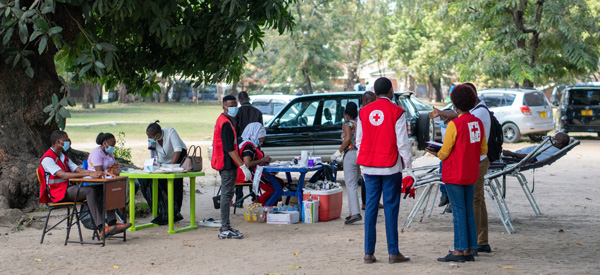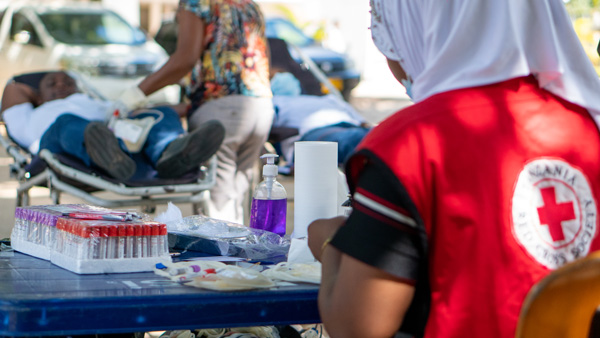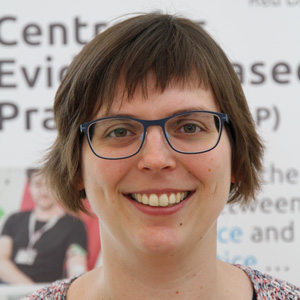African blood donor recruitment guidelines: Belgian Red Cross' equitable approach
Author: Jorien Laermans
The Centre for Evidence-Based Practice (CEBaP) is a global not-for-profit organisation based in Belgium. It utilises scientific evidence to support humanitarian and development aid initiatives, including those of the Belgian Red Cross (BRC). Established in 2009, CEBaP comprises a dedicated team of eight researchers. Our work involves generating systematic reviews, creating evidence-based guidelines, and conducting field research for the aid sector, such as emergency aid and blood supply.
In this blog, we share our story on CEBaP's approach to supporting the ongoing development of an evidence-based guideline on blood donor recruitment in sub-Saharan Africa, with particular focus on the equity considerations that drive this project towards equitable access to sufficient and safe blood.
Blood donation in Africa: what is the issue and why this guideline?
Blood services have the important task of maintaining safe and adequate blood supply. In the African continent, blood donation rates remain too low to meet the demand, as reported by the World Health Organization in 2022. Despite having made steady progress over the last 20 years, in 2020, 38 African countries experienced a collective deficit of over three million units of blood. Shortages are mainly caused by weak donor recruitment programs, cultural resistance, and lack of education that changes people's willingness to donate. The root of this problem often lies in unsustainable funding of the African blood services.
This guideline aims to help identify the most effective blood donor recruitment and retention strategies in sub-Saharan Africa. Once developed, this guideline will be used to train blood donor recruiters in sub-Saharan Africa, both inside and outside of the Red Cross Red Crescent Societies. In this way, blood services will know where to best focus their efforts, particularly in resource-constrained contexts. The guideline itself may help provide equitable access to safe and adequate blood in sub-Saharan Africa.

What is the role of the Belgian Red Cross?
BRC is responsible for providing a constant supply and adequate quantities of safe blood products to hospitals in Belgium. As part of its international projects, BRC’s International Cooperation Department assists other Red Cross Red Crescent Societies in their mandate to support blood services through blood donor recruitment activities.
With its extensive experience in evidence-based guideline development and systematic reviews, CEBaP has the necessary expertise to provide methodological support during the guideline development process, and the systematic search for and synthesis of the best available scientific evidence.

How do we consider and foster equity during guideline development?
The development of this guideline started in January 2023 and will continue throughout 2024. Currently, we have identified the research questions and are conducting the searches and synthesising the evidence. So far, we have considered and addressed health equity aspects at various levels and stages:
Panel membership
For a guideline to be labelled 'evidence-based', it must be informed by all three pillars of evidence-based practice:
1) best available scientific evidence
2) practical experience and expertise of experts in the field
3) preferences and available resources of the target group.
This can only be fully accomplished by including a suitable panel of experts from the start of the guideline project.
For this project, the panel consists of 11 experts from academia, national blood services and African Red Cross national societies from six countries in sub-Saharan Africa (Benin, Burundi, Ghana, Nigeria, Rwanda and Uganda). Care was taken in composing the panel to ensure sufficient diversity and inclusiveness with regard to country and resource settings, gender, area of expertise and interaction levels with blood donor recruiters, and the population of (candidate) blood donors in all types of resource settings. This is of great importance, especially for guidelines where the evidence base is limited in quantity and quality, as the panel members then have to formulate good practice points and/or contextualise evidence from other (non-African or even high-income) settings.
Equitable collaboration in the guideline panel
In preparation for the first virtual panel meeting in June 2023, the panel members were asked to fill out an electronic survey commenting on a draft version of the table of contents and on a set of 13 proposed research questions for the literature review. In addition, they were asked to identify additional topics or aspects that would be useful and important to include, especially given the sub-Saharan African context of the guideline.
By allowing the experts to provide input individually and in writing in advance, we gave everyone an equal chance of expressing their thoughts. Feedback provided through the preparatory survey was bundled anonymously and discussed with the entire panel in a constructive and respectful manner.
Formulating research questions
All panel members agreed that, in order to be useful and contribute to health equity, the guideline would have to provide clear information to the blood donor recruiters on how to address misconceptions and myths about blood donation, and cultural and religious beliefs as obstacles for blood donation, as well as explain why blood services do not offer blood to hospitals free of charge (despite non-remunerated donations). As certain populations may be more prone to these misconceptions and obstacles, one of the research questions will synthesise the best available evidence on important motivators and deterrents for blood donation, keeping in mind the characteristics of the studied populations (e.g., age, socioeconomic status, education level).
Also, rather than gathering evidence on effective donor recruitment strategies in general, we decided to specifically study face-to-face recruitment methods (e.g., talking about the importance of blood donation and promoting it at a village meeting). The reason for this? A lot of African blood services rely on volunteers to recruit candidate donors, and these face-to-face methods may be especially useful in reaching under-served populations.
Finally, we had to keep in mind that African countries still heavily rely on family/replacement donors (i.e., those who give blood when it is required by a member of their own family or community). Setting up a system where 100% of the donations are made by voluntary, non-paid donors requires a lot of resources, which are often not available in Africa. Therefore, it was deemed important to include all types of donations when searching for evidence.
Evidence review and developing recommendations
During the review process, we are documenting the characteristics of the studied populations and interventions carefully. Once the evidence review is complete, we will prepare a draft guideline and seek input from the expert panel. During this phase, the applicability and generalisability of the evidence to populations experiencing inequities will be considered when developing recommendations and good practice points. Moreover, the panel will help identify equity issues in guideline implementation.
Lessons learned
Although the guideline has not yet been drafted or put into practice, we are convinced that the equity considerations we have made so far will help improve the overall quality and facilitate the implementation of the guideline. Only if the guideline addresses the right research questions and provides relevant and usable guidance, will it become a one-stop-shop resource for African blood donor recruiters. Identifying strategies that have been shown to be effective will enable the African blood services to allocate their limited available financial resources in the best way possible.
Key messages
1. Compose a guideline panel of experts that can identify equity considerations.
2. Keep equity issues in mind throughout the entire process, from defining and refining the research questions to formulating recommendations.
3. Think of ways to facilitate equitable collaboration of the guideline panel, so that all panel members feel respected and listened to.
Authors
Jorien Laermans1,2, Michiel Jennes3, Bert Avau3 and Emmy De Buck1,2
1. Centre for Evidence-Based Practice (CEBaP), Belgian Red Cross, Mechelen, Belgium
2. Department of Public Health and Primary Care, Leuven Institute for Healthcare Policy, KU Leuven, Leuven, Belgium
3. International Cooperation Department, Belgian Red Cross, Mechelen, Belgium
Conflict of interest
Belgian Red Cross is responsible for supplying adequate quantities of safe blood products to hospitals in Flanders and Brussels on a continuous basis and is reimbursed for this activity.
Disclaimer
The views expressed in this World EBHC Day Blog, as well as any errors or omissions, are the sole responsibility of the author and do not represent the views of the World EBHC Day Steering Committee, Official Partners or Sponsors; nor does it imply endorsement by the aforementioned parties.
